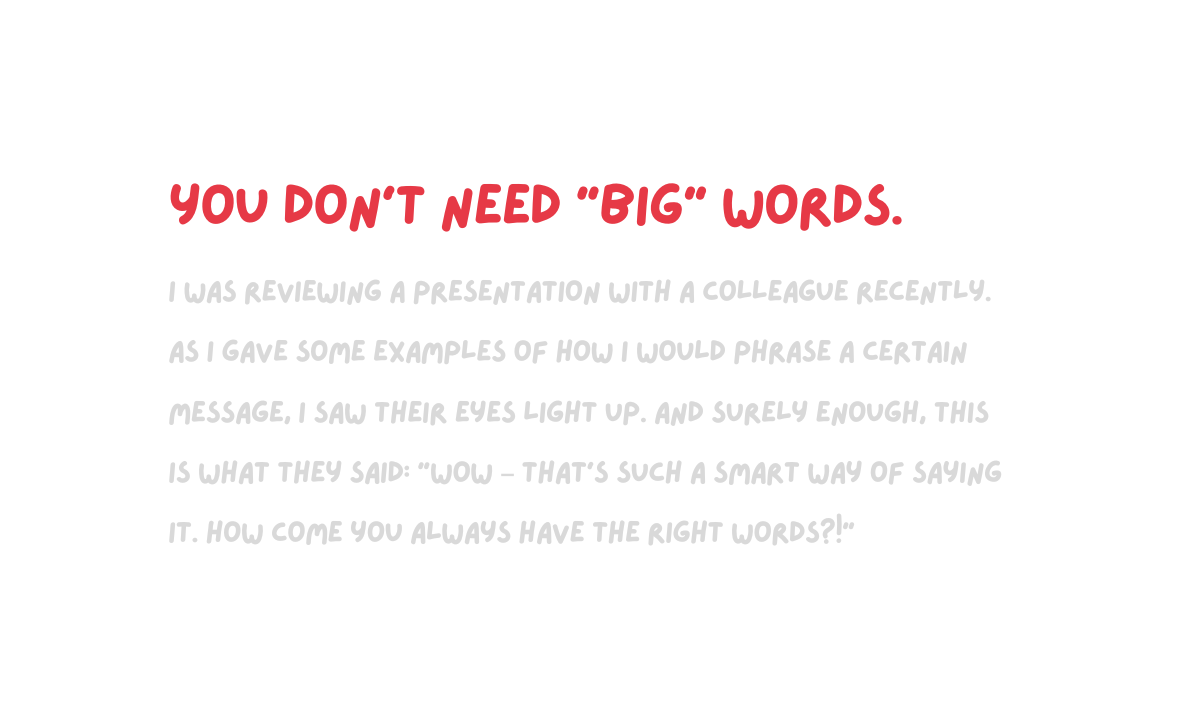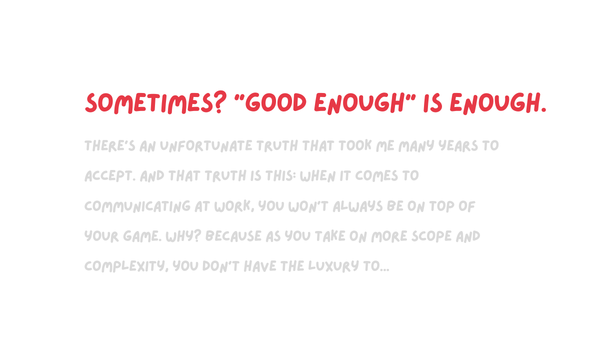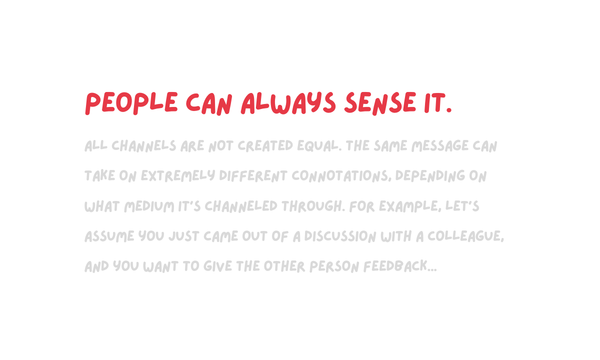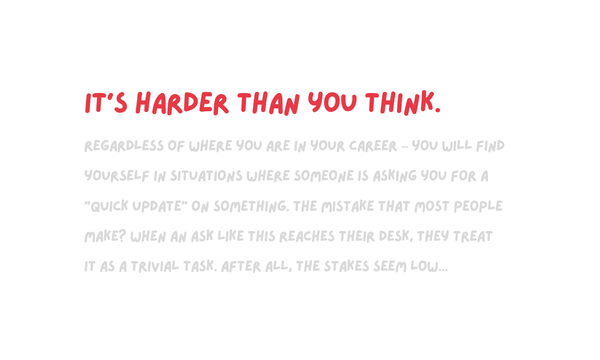Size doesn't matter (when it comes to words)

I was reviewing a presentation with a colleague recently.
As I gave some examples of how I would phrase a certain message, I saw their eyes suddenly light up.
And surely enough, this is what they said:
"Wow – that's such a smart way of saying it. How come you always have the right words?!"
I was happy that my ideas were well-received, of course. But it was a rather "deja vu" moment for me.
Why? Because I remember having the exact same reaction myself many years ago.
There were certain people I worked with that just had a way with words, and I could never quite figure out what it was.
All I knew was that whenever they spoke – it just worked.
The secret isn't to chase big words, but...
It turns out that my colleague was only partially right with their observation.
Because while I had become a better speaker over the years? It wasn't necessarily because I started using big words to "sound smart."
Instead, the key was this: I learned to optimize for a specific set of principles when I spoke. Sometimes that involved "big" words; sometimes it didn't.
But the words themselves were never my focus. The principles were.
And this principles-based approach? It's what helped me become a more effective speaker, without feeling like I was "losing my voice" by copying someone else's vocabulary.
So in today's newsletter, we'll walk through these exact principles. Feel free to apply these principles – so that you can communicate effectively, but in your own unique way.
👋 Join 5000+ readers and subscribe to Herng's Newsletter for free:
Principle #1: Don't chase big words. Chase precision.
A common mistake at work is this: overusing jargon and corp-speak in order to come off as "professional."
This is also why I was wary of my colleague's observation – because I was never chasing "smart-sounding" words. If anything, that label came with a negative connotation for me.
Instead, I was chasing precision. And that's what led to a somewhat different set of vocabulary.
For instance, consider the following example. There's lots of big words, but it's incredibly imprecise:
- ❌ "We're not using enough blue-sky thinking in our current approach. We need to reimagine our strategy in order to properly extract value from our assets."
The issue? This is essentially a "smart-sounding" way of saying we're not thinking big enough (and therefore not monetising enough).
But it's highly ambiguous – and therefore rather useless.
Consider an alternative, where there's an attempt to be precise about where the problem is:
- ✅ "We're ignoring 3 critical use cases for our product – none of which we originally designed for, but each imply a $xxxM addressable market."
There are no fancy words in this statement. But it's so much more effective – because it's precise.
Here's another example:
- ❌ "We're not able to make progress because we're not getting enough cross-functional support." (= vague and imprecise)
- ✅ "Our deal velocity is 50% slower than other teams, because there is no dedicated staffing on the legal side." (= specific and still sharp)
Once you start optimizing for precision, you'll also realize that this is why certain people just sound "different."
Because they're not chasing big words – they just chase the "right" ones in pursuit of precision.
Principle #2: Don't chase big words. Chase efficiency.
Let's say that you take the aforementioned principle to heart, and decide to deliver the following spiel, which is highly precise and specific:
- "There's a downside with introducing this policy, which is that if people know that budgets will be adjusted based on how much they spend, then they will be incentivized to spend more than they actually need to, because they know that it will actually increase their future budgets, and that is the opposite of what we want."
The issue with communicating this way? It's not that it's imprecise or vague.
Rather, it's just an incredibly wordy way of communicating. You might lose your audience halfway through.
Consider, instead, if you simply said:
- ✅ "There's a downside with introducing this policy – which is perverse incentives. People will not be motivated to stay frugal."
Notice that we didn't introduce jargon for the sake of doing so. It's just that this was one of the sharper ways to get our point across – so we opted for it.
Does this mean we need to update our vocabulary so we have short and punchy ways of describing our entire world? Not at all.
In fact, there are many situations where the simpler the shorthand, the more effective it is.
For instance, consider the following comment:
"This slide feels a bit weak, because its dedicates a lot of real estate to explain the envisaged outcomes of these initiatives, but it doesn't actually establish the strategies, partnerships, and resourcing required in order to deliver those outcomes."
Don't get me wrong – this is an insightful comment. It's incredibly precise as well.
But if it were articulated live? It comes off as a bit wordy. The audience needs to be fully engaged to "get" it.
Consider, by contrast, the following alternative:
- ✅ "This slide feels a bit weak, because it focuses too much on the what, but not the how."
There's no fancy verbiage – but we've managed to land our point while being sharp and succinct.
And the best part of this? Now that the audience already "gets" our core message, we have the option of expanding further ("...for example, there's no mention of..."). We don't have to worry if we'll lose our audience.
Of course, you want to be careful: "short" doesn't always mean "clear." You don't want to be chasing shorthand and soundbites blindly. It can backfire.
But the truth is this: most people tend to make the mistake of saying too much, rather than saying too little. You think you're being helpful by providing more detail – but your audience is already exhausted trying to keep up.
They're listening, but not processing.
So if possible? Find efficient yet effective ways to deliver your message. As long as you can do that – the words don't really matter.
👋 Join 5000+ readers and subscribe to Herng's Newsletter for free:
Principle #3: Don't chase big words. Chase the "so what."
Consider the following message:
"AI-powered toilet bowls will become a $1B+ market worldwide in 5 years, yet we have no resources today focused on it. Meanwhile, our competitors are all betting on it already, which we know based on what they revealed in recent earnings calls."
Is it precise? Yes. Is it wordy? Slightly, but not egregious.
So what's the problem?
Well, here's the issue: when we communicate this way, we're simply laying out a bunch of facts, and asking the reader (or listener) to decide how to feel about it.
We're doing a lot of good things by supplying worthy information – yet stopping short of helping our audience make proper sense of it.
However, consider what we could achieve instead, if we communicated this way:
- ✅ "We're leaving a lot of money on the table. AI-powered toilet bowls will be a $1B+ opportunity, and our competitors are at least 18 months ahead of us in terms of research & development efforts."
The key difference? You focus on establishing the "so what" for your audience. And you lead with it to boot.
(In this case, that "so what" is straightforward: it's to sound the alarm and instill a sense of urgency.)
Of course, you need details to back up your claim – but you can easily do that after you've properly anchored you audience and told them how to feel. Only then will they be in the right state of mind to process what you have to say.
A common mistake people make? It's to focus disproportionately on laying out the facts, while forgetting to spell out the implied headline.
When they do that, the "so what" is buried. The message then fails to land.
Quick recap
On the surface, the key to effective communication may seem to require transforming your vocabulary – but that's really not the case.
Because if you fixate too much on the words themselves – you'll miss the bigger point. And you'll lose your own voice in the process.
So don't chase the words. Chase these principles instead:
- Precision - Find ways to say exactly what you mean.
- Efficiency - Be sharp and succinct, so you don't lose your audience.
- "So What" - Call out the implications. Don't just lay out facts.


